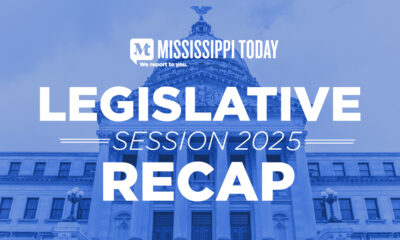Mississippi Today
Mississippi could face health research funding cuts under Trump administration policy

Mississippi universities and nonprofits could lose tens of millions of dollars in federal funding for health research if a Trump administration policy withstands legal challenges.
A federal judge in Boston temporarily blocked the National Institutes of Health’s Feb. 7 plan to slash “indirect cost” rates – the portion of grant funding used for facilities and administration – to 15% after 22 attorneys general sued the Trump administration. Mississippi did not join the lawsuit.
Mississippi universities and other institutions have active grants worth over $97 million, according to publicly available data from National Institutes of Health. Grant funding from the agency directly supported over 1,200 jobs and $220 million in economic activity in Mississippi during the 2024 fiscal year, according to United for Medical Research, a group that advocates for National Institutes of Health funding.
“This agency action will result in layoffs, suspension of clinical trials, disruption of ongoing research programs, and laboratory closures,” wrote the plaintiffs in the lawsuit.
The National Institutes of Health represented lower indirect cost rates as a way to carefully steward taxpayer money in its notice of the change, noting that it is difficult to track how indirect costs are used and that private foundations generally offer grant recipients indirect cost rates below 15%.
It pointed to the Bill and Melinda Gates Foundation, one of the largest funders of health research, which has a maximum indirect cost rate of 15%.
In 2023, the National Institutes of Health spent $35 billion on 50,000 competitive grants that supported 2,500 institutions. A fourth of the funding – $9 billion – went to support indirect research costs.
University of Mississippi Medical Center, the state’s only academic medical institution and the recipient of half of Mississippi’s National Institutes of Health grant funding, has a negotiated indirect cost rate of 55%, meaning the institution receives an additional 55 cents for overhead for each dollar granted for research funding. Slashing this rate to 15% overnight would have drastic implications for the institution.
The University of Mississippi Medical Center’s 64 active National Institutes of Health grants total $49 million and support cancer, maternal and infant health and health disparities research. The funding also supports the Jackson Heart Study, the largest-ever study of cardiovascular disease in Black Americans.
A spokesperson for the University of Mississippi Medical Center said the institution is monitoring the situation but declined to comment further.
A press release published by the medical center in 2023 indicated that National Institutes of Health grants account for over half of all research funding at UMMC.
“Without NIH funding, we would never have been able to make substantial advances in understanding the pathophysiology of major diseases such as hypertension, heart failure, obesity, diabetes and chronic kidney disease,” Dr. John Hall, the chair of the Department of Physiology and Biophysics, said in the 2023 press release.
Mississippi State University and the University of Mississippi each currently have active National Institutes of Health grants worth over $8 million. Grants at the universities support studies of opioid addiction, infertility and viral infections.
The University of Mississippi said it is operating normally in light of the judge’s temporary order barring the new policy, but did not respond to questions about its indirect cost rates or how the cuts could impact its research faculties. Mississippi State University did not respond to a request for comment.
Other recipients of National Institutes of Health grant funding in Mississippi include universities, My Brother’s Keeper, a nonprofit with a focus on health disparities in Mississippi, and Delta Health Alliance, a nonprofit that works to improve access to health services in the Delta.
Leaders of research institutions in other nearby states have been vocal about the impact the cuts could have on their states.
Louisiana State University’s vice president of research and economic development said the impact of the proposed cuts would be “devastating,” reported Louisiana Illuminator.
The cuts will “mean fewer new treatments will get to children and therefore that fewer children will be saved,” said Dr. Charles Roberts, the director of the St. Jude Comprehensive Cancer Center, in a post on the hospital’s X account.
This article first appeared on Mississippi Today and is republished here under a Creative Commons license.![]()
Mississippi Today
Speaker says House willing to renegotiate typo tax bill
House Speaker Jason White acknowledged for the first time on Monday that House leaders knowingly passed a typo-riddled plan to overhaul Mississippi’s tax system that Senate leaders have since admitted was a mistake.
White also said his Republican caucus is willing to use a still-alive Senate bill to restart negotiations on some elements of the tax overhaul that could override the bill headed to Gov. Tate Reeves’ desk. The speaker appeared to underscore that last week’s typo tax snafu gave his House caucus the upper hand, and that they would extract further concessions from the Senate in exchange for restarting negotiations in a conference committee.
House leaders have pushed for years for eliminating the state personal income tax, and doing so in relatively short order. The Senate has urged a more cautious approach, saying it’s foolhardy to slash a third of the state’s revenue in uncertain economic times. Senators last week had conceded to eliminate the income tax, but only with economic growth “triggers” as safeguards — the tax wouldn’t phase out unless the state saw robust economic growth and controlled spending.
Or so they thought. The Senate bill had typos that essentially nullified the growth triggers and would eliminate the income tax nearly as quickly as the House proposed. The House passed the flawed bill on to the governor, who said he will sign it into law.
READ MORE: Policy analyst: Income tax elimination risks significant harm to Mississippi’s future
Speaker White on Monday confirmed for the first time when he and his caucus realized the Senate had sent them a bill with language different from what the chamber had intended to pass, even as he claimed he didn’t know what the Senate’s intentions were.
“Wednesday is when we knew. We met and we talked about it. Then we met as a Republican caucus and talked about it. And y’all heard the debate in here as the chairman called it up to concur,” White said.
The two chambers had appeared to remain dramatically far apart from a final compromise. White said his chamber was left in the dark by Senate leaders, who often call their chamber the “deliberative body.”
“You hear a lot about transparency, deliberateness,” White said. “It really wasn’t until after they passed it that were able to look at it, and they certainly didn’t talk to us about it on the front end.”
White said the Senate had communicated through multiple channels, including Senate Finance Chairman Josh Harkins, that the bill the upper chamber sent over would be their final offer. So he said the House to take the Senate at its word and send the bill with the Senate’s mistake to the governor.
“They said that’s it, we’re not going any further, we’ve barely got the votes, that sort of thing,”White said. “So that played into our decision. So do we take this, take them at their word that this is it, or do we invite conference and see if they can get this fragile vote count together again on their end?”
The House on Thursday morning surprised the Senate, unaware of its typos, by voting to agree with the Senate’s latest plan.
But lobbyists, legislators and the media soon discovered the reason the House hurried to pass the Senate plan is because senators inadvertently inserted decimal points that essentially rendered the growth triggers meaningless and would almost ensure a quicker timeline for eliminating the income tax.
“After they passed it, we got theirs amended and sent to them, then we sat down and started looking at theirs, and we, I mean, it’s page six and seven,” White said. “It’s the first thing you see when you get into the meat of the bill … So it was pretty apparent once you read it, you’re like ‘that trigger doesn’t seem as cumbersome as what has been explained or talked about.’ So we’re like, we can live with this.”
Now, Senate leaders are hoping they can convince the House to correct the mistake, but it appears that might not be an easy sell with the House.
“We are willing to talk about a reasonable trigger, but not a cumbersome trigger that nobody can ever hit,” White said. “Of course, if we’re going to revisit that, there are other features of the tax reform package that we would certainly like to address as well.”
Republican Lt. Gov. Delbert Hosemann told Mississippi Today he would not talk about the bill and deferred comments to Harkins, the chamber’s lead tax-cut architect. Hosemann last week feigned ignorance about the typo and tried to claim victory over the final product.
On Monday, Harkins, a Republican from Flowood, took responsibility for the error but said he hoped House leaders would work with the Senate to “clarify any ambiguity” about the “growth trigger” language because it was not what the Senate meant to propose to the House.
But it appears House leaders, who have expressed frustration with the GOP-majority Senate this year for killing a lot of its major policy proposals, want the Senate to reverse course and pass some policies that they have otherwise been hesitant to agree to.
If negotiations were to resume, the House hopes to use its leverage to force the Senate into adopting its preferred approach to changing the structure of the Public Employees Retirement System, which had been a key wedge issue between the chambers in their negotiations over tax reform. The Senate wants to cut benefits for future public employees while the House wants to divert about $100 million a year in state lottery money to the system.
Harkins was not asked about White’s specific comments on the public employee retirement system. Still, he told reporters, in general terms, he did not think there was any appetite in the Senate to dedicate a recurring revenue stream to the retirement system.
The Rankin County senator stopped shy of rebuking House leaders for how they handled the tax bill, as some have done behind the scenes. But he questioned whether his fellow GOP House colleagues “worked in good faith” to deliver a final compromise.
“In legislating, when you’re asked to work in good faith to help get to a position, and you do so, I think there should be some mutual respect on both sides,” Harkins said. “We’re both trying to get to a policy that we can both agree on.”
When asked if he was concerned senators might feel burned by the House leadership, White said: “If they were misled, it was on that end of the building. There was no misleading from down here. They amended our bill as they saw fit.”
Harkins also said that he met with Lamar, his House counterpart, sometime around Friday, March 14, to discuss what the Senate planned to propose regarding trigger language, though he was still ironing out specific details. The two chambers then passed their different proposals the following Tuesday.
Gov. Reeves has said on social media that he intends to pass the mistake-filled bill into law. The growth triggers, under the plan, would not take effect for four years. So lawmakers could try and address the mistakes in future sessions.
Given the four-year window before triggers would take effect, White said legislators didn’t necessarily have to reach an agreement. They could instead tweak the bill when “you would conceivably have other leadership in place.”
This article first appeared on Mississippi Today and is republished here under a Creative Commons license.![]()
Mississippi Today
Gas outage affecting thousands in Lee County nearly resolved
Five days after an Atmos Energy crew accidentally released high-pressure gas in northeast Mississippi, the company is nearly done restoring gas to the over 17,000 affected customers.
All 17,000 customers have their gas restored, and technicians are working to help a handful of customers get their appliances relighted, according to Atmos.
The accident on March 12 injured three contractors and caused outages to commercial and residential customers in Belden, Guntown, Plantersville, Pontotoc, Saltillo, Shannon, Tupelo, and Verona. The three injured workers were contractors with Atmos, but the company said it doesn’t know their conditions.
“Atmos Energy’s highly-trained technicians have visited every customer multiple times, going door to door, to restore service in the impacted areas,” reads the official updates page.
“If you were not home or at your business?when our crews were restoring service,?a door tag with instructions to schedule an appointment was left on your front door. If you are without gas service, please call 866.322.8667 and press 1 to schedule an appointment to restore your gas service.”
An adult who lives in the home or is a representative of the business must be present for the restoration to take place.
Over 700 technicians from across eight states are on the job to restore gas, going door-to-door for customers.
This article first appeared on Mississippi Today and is republished here under a Creative Commons license.
Mississippi Today
Fifth student receives full ride to college on writers scholarship
The grin on best-selling author Angie Thomas’s face could not have been bigger. The Zoom call, surprising Owen Jarvis with news he had won the full-ride scholarship to Belhaven University named in Thomas’ honor, was a giddy secret that was hers to share.
“Sometimes when it happens, I feel like Oprah when she gave out the cars,” a gleeful Thomas said of informing the winner. For the Young Adult author and Jackson native, now living in Atlanta, the activity falls right in line with her stories’ focus on young people as they find their own voice and the power it can hold.
Thomas, a 2011 Belhaven grad, is the author of New York Times bestselling novels “The Hate U Give” and “On the Come Up” (both made into major motion pictures), “Concrete Rose” and “Nic Blake and the Remarkables: The Manifestor Prophecy.”
The scholarship in her name began in 2020, established by Belhaven University to support aspiring writers as they pursue dreams of authorship. “To watch in real time, the burden lift off of them, is incredible because, you know, we talk about education, but we don’t talk enough about the cost of education, and the stress and the burden of it,” Thomas said, noting that several winners were the first in their families to attend college.
She attended Belhaven on partial scholarship, but still had to take out student loans because of family financial struggles. “My mom was a full-time caregiver to my grandmother, and so money was tight at the time. There were plenty of times where I wasn’t sure how I was going to pay for gas … much less books and all of those things. So, by the grace of God, I was able to get my education and now to know that that’s a burden that these future creative writing graduates won’t have — that’s incredible to me, and to know that it was done in my honor is even more incredible.”
Jarvis, of Pelham, Alabama, is the fifth recipient of the Angie Thomas Writers Scholarship. While only one is awarded annually, other applicants receive partial scholarships. “They kind of set me up really, really good,” he said with a sheepish chuckle about the surprise. He thought the call was a finalist interview, right up to the moment Thomas chimed in with congratulations. “I was blown away.”
He grew up in south Florida and moved to Alabama as a teen. His writing focus took hold the summer between freshman and sophomore years in high school, after a friend’s death. “It was kind of a big shock in my life, and the way I dealt with the grief was writing poetry,” he said, then moving on to other forms. A self-described fantasy writer, he also delves into sci-fi, dystopian stories and more.
“There’s so many crazy things in the world today that you can just look at and say, ‘Wow, that would be really interesting to make it a little more extreme.’ It’s not peering into the future, but it’s sort of, almost, a ‘What if?’” he said.
The first student awarded the scholarship, Imani Skipwith of Jackson, graduated in April 2024. Now pursuing her master’s degree at Jackson State University, she is also working on a poetry collection and exploring creative nonfiction. “It just opened a door,” she said of the scholarship that made college more accessible. “It’s a reminder, for me, that I’m on the right path.”
Skipwith is an avid reader turned writer. “I read a lot, but I didn’t see a lot of characters that looked like me. And, if they did look like me, they were the supporting characters of white people. … They weren’t representative of me.” Later, her interest expanded into the mental health of her community, and highlighting needed change.

“I like to say that I write for the eldest daughter,” said Skipwith, whose own sister is about a decade younger. “In a sense, I kind of helped raise her. … There is a lot that I experienced, being an eldest daughter, and being a Black eldest daughter, that I felt like I should share, for guidance.”
Thomas pulls from her own experience for advice and encouragement for scholarship students. “I always remind them that they earned this, and they deserve it,” the author said. “One thing I’ve noticed about us writers — we have a lot of doubts, and all of us, at one point or another, struggle with imposter syndrome and we have these moments, even when we’ve seen success, where we’re like, ‘Did I really?’ ‘Am I that good?’
“I always want them to know that they deserved it, and I always, too, want to remind them that this is a journey,” she said. The university’s creative writing program, founded and led by Randall Smith, can help hone young writers’ gifts.
“Seeing these young people come in, finding their voices through the program, and also seeing such a diversity in the voices is incredible. It’s much more diverse now,” she said, than when she was the only Black student in the program. “Not just racial diversity, but diversity in the voices and the types of stories young people are telling, and the socioeconomic backgrounds that are now coming to the program, and it’s a great place to nurture that.”
Next up from Thomas is the second book in her Nic Blake series for younger readers, due out this fall, “It’s a fantasy series that partially takes place in Jackson, which is fun to be able to do, to bring a little magic to Jackson because Jackson sure could use it.”
Though she cannot talk now about her next Young Adult book in progress, “I think that fans of ‘The Hate U Give’ will be happy once this one is announced,” she said.
Work on movie and TV scripts continues.
Scholarship involvement is a good fit for a writer who sets stories, targets audiences and puts her belief in the younger set. “I’ve, in a lot of ways, given up on older generations for fixing and changing,” Thomas said, with a characteristically youthful laugh. “Day by day, my hope in older generations is just dying out little by little. And so, I see young people, obviously as the future, but as the hope.
“What I’m doing, hopefully, is an investment in the future, and seeing a world more like the one I would love for us to have right now.”
She wants more young people to recognize and use their power. “I look at every movement in this country, specifically, in which true change was achieved and usually young people were either at the forefront of it, or they were the motor behind it.
“If I’m the one who wants to see change in the world, I think the best way to do that is to invest in young people. Invest in them through the stories that I tell. Invest in them through the opportunities that I can provide, and just give them mirrors, windows and sliding glass doors.” Books, films — literature, period — can do that, she said.
“They can show young people themselves, and help them see the beauty in themselves, the power in themselves, or they can show young people lives unlike their own situations and … to give them a window into others’ lives. Or, they can be a sliding glass door that opens up opportunities for them to see a wider world.
“One of the big issues we have right now is that we have people in power who have a very limited worldview.
“If we want change, we have to make sure we’re giving them a worldview that is beyond just their little pocket of the world, so that they can understand the world, and they can understand others better. And so, honestly, we can at least have some empathy again.”
This article first appeared on Mississippi Today and is republished here under a Creative Commons license.![]()
-

 News from the South - Kentucky News Feed5 days ago
News from the South - Kentucky News Feed5 days agoSaying it’s ‘about hate,’ Beshear vetoes ban on DEI in Kentucky public higher education
-

 News from the South - Oklahoma News Feed5 days ago
News from the South - Oklahoma News Feed5 days agoSurvivors speak out ahead of Oklahoma inmate’s scheduled execution
-

 News from the South - North Carolina News Feed7 days ago
News from the South - North Carolina News Feed7 days agoNC Senate committee approves permitless carry of concealed firearms for residents 18 and older
-

 News from the South - Georgia News Feed6 days ago
News from the South - Georgia News Feed6 days agoWoman accused of stabbing neighbor's dog to death | FOX 5 News
-

 Mississippi Today7 days ago
Mississippi Today7 days agoFormer doctor remained at Mississippi State for a year after nurse reported concerns
-

 Mississippi Today7 days ago
Mississippi Today7 days agoMayor Simmons: Greenville aims to be city of hope and opportunity
-

 News from the South - South Carolina News Feed6 days ago
News from the South - South Carolina News Feed6 days agoResidents question Georgetown Co. plan for low-density development on golf courses
-

 News from the South - South Carolina News Feed5 days ago
News from the South - South Carolina News Feed5 days ago'Cold-blooded murder:' New filed court documents released for Marion man charged in OIS

















































